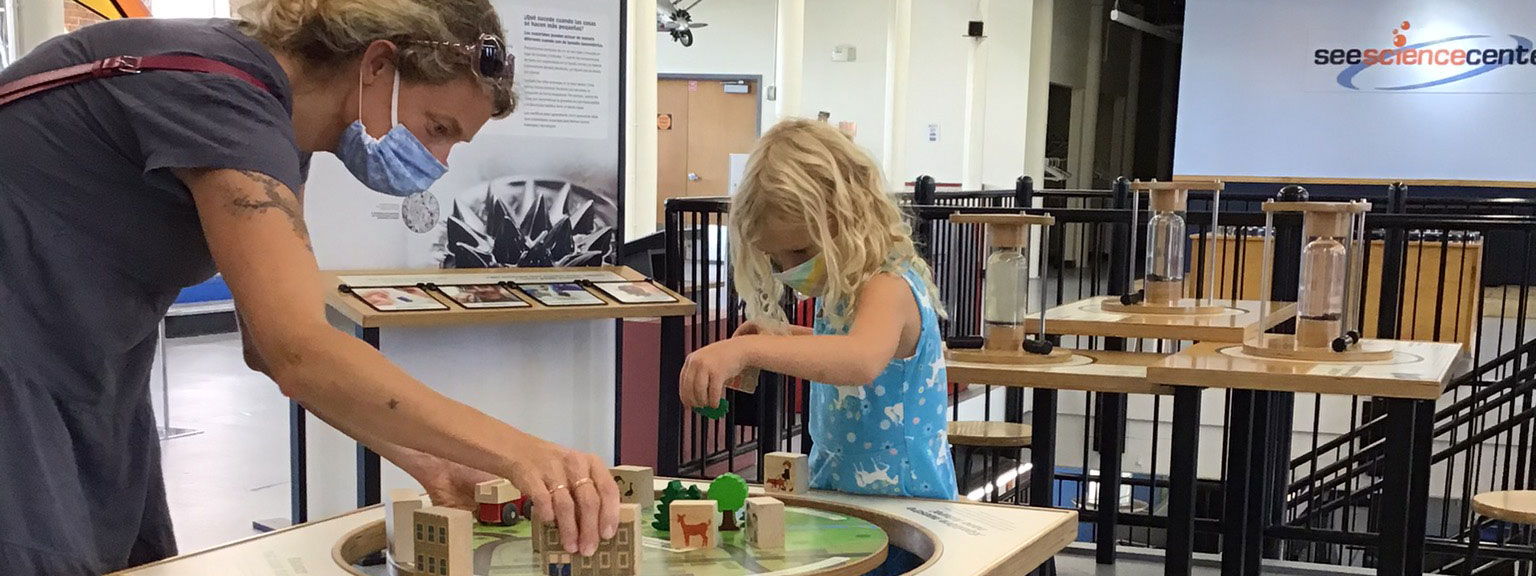SEE Science Center’s
Shana Hawrylchak and Peter Gustafson

The SEE Science Center in the Manchester Millyard has engaged visitors of all ages for more than 30 years with interactive exhibits on light, electricity, sound and more. (Courtesy SEE Science Center) Shana Hawrylchak is executive director of the SEE Science Center in Manchester, and Peter Gustafson is its deputy director. The center has engaged visitors of all ages for more than 30 years with interactive exhibits on light, electricity, sound and more, and in that time has been inspiring kids in STEM and innovation.
Q. What should everyone in New Hampshire be aware of about the SEE Science Center?
Hawrylchak: I feel we’re one of those hidden gems of Manchester. We’re one of the few hands-on science centers in New Hampshire, and we serve Manchester, Nashua and surrounding towns and counties. We have over 90 hands-on exhibits for families to play with; we do demonstration programs, birthday parties, you name it. It’s a fun place for families to get together and spend time together as a family.
Gustafson: The exhibit topics range from space to forces in motion to dinosaurs. We have exhibits on properties of light bubbles; we have exhibits that focus on the human genome, biology, simple machines, electricity and magnetism. Those are your typical exhibit topics for a hands-on science museum — mostly physics.
And then we have the LEGO Millyard Project, which is a Guinness-record-holding exhibit. It’s the largest permanent Lego exhibit at minifigure scale in the world, and it’s a model of the Millyard in Manchester. It has running trains, more than 3 million Lego bricks and over 6,000 Lego mini-figures. We get a similar reaction from kids and adults. It’s a big wow factor.
Q. What are the hands-on STEM projects kids can work on?
Hawrylchak: We really try to make components friendly for kids and families to come and experiment with, so you’re not just walking around looking at displays — you’re actually interacting with those phenomena and getting to see how they work. We also do all sorts of live demonstrations with our program staff. We have tons of hands-on programs for schools, which we specialize to the different age groups that come through and the types of things that will excite them to get involved in STEM.
Gustafson: We also have a mobile version of our programs, so we can go do chemistry in a classroom or do a LEGO engineering and problem-solving class with hands-on activities. We can go to classrooms and run the programs there.
Q. How are you managing to keep up with this ever-changing STEM world and make sure your exhibits are up to date with all this evolving technology we see?
Hawrylchak: I think a big part of that is working with our partners. For example, we’ve been partnering with the NH Tech Alliance to showcase their products of the year, because we want to showcase a lot of these amazing inventions that are happening right here in New Hampshire. And then we’ve been partnering with different companies for our programs we do for schools as well. So, for example, we partner with ARMI to develop some STEM programs for middle school-aged kids to let them know that these careers will be a potential in the future. A lot of kids get out of high school and think, “I’ve got to go to Boston.” And they don’t; they can stay local and contribute to the amazing things that are happening in our local area.
Gustafson: We met yesterday with a fellow from Rockwell Automation, and they’re bringing automation to the car industry or the food industry, and now perhaps the bioengineering industry. Those kinds of opportunities are there for high school graduates, college graduates, PhDs — there’s opportunities for all kinds of people, and we’re so excited to tell kids about it.
Q. It’s really important to shine the spotlight on organizations like you that are doing amazing things. I want kids to have this exposure so that they’re like, I can go into tech or do science or engineering. That exposure is very critical early on.
Hawrylchak: I think you bring up a good point. A lot of times kids look at the sciences like the subject matter they take in school, and those aren’t the jobs out there, the cool opportunities. So having that opportunity for kids to see what some actual jobs are helps open their eyes to all of the little nooks and crannies that they didn’t even know existed.
Flo Nicolas is an attorney, co-founder and chief operating officer of DEI Directive, a diversity, equity and inclusion technology firm that provides a comprehensive DEI Intelligence Platform. She also produces Get Tech Smart and Get Resource Smart, which she shares with partners in The Granite State News Collaborative.